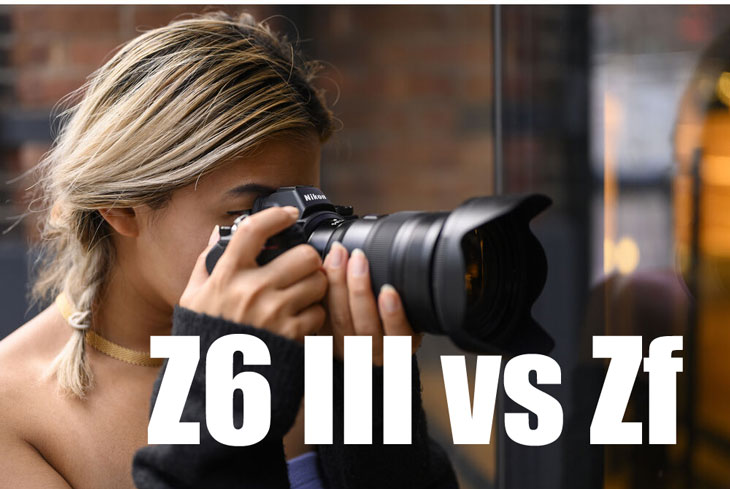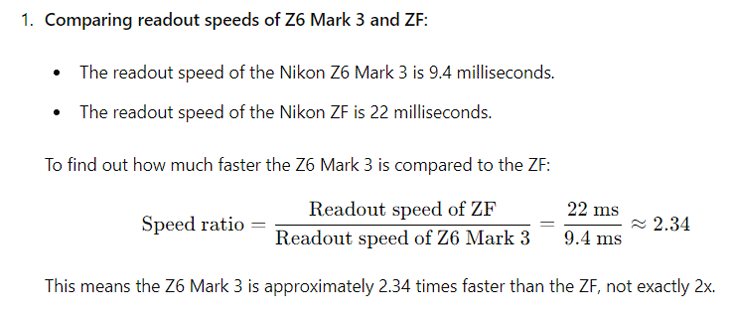
As you can see in the table below, the Z6 Mark III camera features a newly developed 24.5 BSI FX-format full-frame Partially Stacked CMOS sensor with an upscaled design that enhances low-light performance and improved dynamic range compared to the sensor we have in the Nikon Zf/ Z6 II. The readout speed of the sensor also improved and
Dual Expeed 7 image processor: Inside the Nikon Z6 Mark 3 camera, with the help of the new dual Expeed 7 image processor able to extract 6K video resolution up to 60 frames per second in 12-bit N-RAW format. Additionally, you can also shoot continuously up to 120 frames per second in DX crop mode, all due to the fabrication of the dual Expeed 7 image processor inside the Z6 Mark 3 camera body.
Sensor Readout Speed – Nikon Z6 III vs Nikon ZF
Recently announced Nikon Z6 Mark 3 camera with its Partially stacked CMOS sensor is approximately 2.34x faster than the Nikon ZF 24 megapixel FX format sensor. So we are not commenting on the image quality here; of course, we will compare the image quality when the samples of the camera come out. But at the very same time, based on the readout speed of both cameras, the overall calculation that we are getting is that the Z6 Mark 3 camera is at least 2.34x faster than the ZF sensor, resulting in less rolling shutter effect in motion pictures and images.

The readout speed of the Nikon Z6 Mark 3 camera while capturing 4K 60p video in 10-bit mode is approximately 9.4 milliseconds, whereas the readout speed of Nikon ZF camera while capturing 4K videos at 4k 30p Video in 10 bit is approximately 22 milliseconds, which is approximately 2.34x more than the Z6 Mark 3 camera. As shown in the calculation above. As we know, Nikon cameras are not able to capture 6kps Raw videos, so the readout speed is not available for that specific set of data.
5.76 million-dot electronic viewfinder: This helps photographers capture perfect decisive moments with a single click. It provides the vision and accuracy needed by professional photographers. No one else in the competition uses such a high-resolution electronic viewfinder in their cameras.
Continuous Shooting Speed
14 FPS mechanical shutter and 20 FPS electronic shutter in full resolution: When shooting in NRAW, the maximum continuous shooting speed is 14 frames per second with the mechanical shutter and up to 20 frames per second with the electronic shutter. The maximum shooting speed can be obtained is 120 frames per second with the electronic shutter in DX mode.
The camera will feature the same artificial intelligence image stabilization algorithms as seen in the Nikon ZF camera, The IBIS center moves along with the AF point of the camera, so you get a true 8 Stops of IBIS from your camera. So, Nikon Z6 Mark 3 camera exhibits a class-leading image stabilization system that no competitor offers at this present time.
The autofocus is said to be much improved compared to the existing Nikon Z8 autofocus tracking algorithms. The autofocus coverage on the sensor is approximately 100%, which is not even possible with the latest Nikon ZF camera, which has a coverage of approximately 90% of the frame. The Z6 Mark 3 camera’s autofocus tracking mechanism has been upscaled to match the performance of competitors like Sony and Canon.
In terms of video resolution, the camera is able to record 6K videos up to 60 frames per second in N-RAW format internally on CFexpress Type B cards. For everything recorded in RAW, it is recommended to use CFexpress Type B cards. 4K recording up to 120 frames per second is available in DX mode.
Price-wise, the camera costs more than the Nikon ZF, so it’s now decision time. If the extended set of features, such as enhanced video core specifications or the maximum burst speed of up to 120 frames per second, matter to you, then you should invest in the Z6 Mark 3 camera. Otherwise, the Nikon ZF is still a good option with extensive manual control.
| Feature | Nikon Z6 III | Nikon Zf |
|---|---|---|
| Model Code |
N2214 | N2137 |
| Sensor | 24.5 MP BSI, low light, high dynamic range [New Sensor] | 24.5 MP BSI |
| Processor | EXPEED 7 Dual | EXPEED 7 |
| Video Capabilities |
6K 6048 x 4032, 12-bit NRAW, 4K 60fps ProRes RAW, Full HD 240fps 8-bit crop |
4K UHD 30p, Full HD 60p |
| Viewfinder | 5.76m dot EVF | 3.68m dot EVF |
| LCD Screen | Improved vari-angle | Vari-angle LCD |
| Shooting Performance |
14 fps mechanical, 20 fps electronic (RAW, 14-bit), 120 fps JPEG (DX) |
14 fps continuous shooting |
| Record Time | 37-120 minutes | N/A |
| Shutter Speed | 1/16000 sec | 1/8000 sec |
| Shutter Type | Mechanical & electronic | Mechanical & electronic |
| Autofocus Points | 299 | 299 |
| Focus Algorithm | Updated, better than Z8/Z9 | Similar to Nikon Z8 |
| AF Coverage | Near 100% | 90% |
| Stabilization | 7 or 8-stop VR (same as Nikon Zf) | 7-stop VR |
| Pixel-Shift HR Mode |
Yes | Yes |
| Memory Cards | CFexpress + SD | CFexpress + SD |
| Battery | EN-EL15 | EN-EL15c |
| Battery Pack | Nikon MB-N14 | Nikon MB-N11 |
| Body Design | Hybrid between Z6 and Z8 | Retro-inspired |
| Dimensions | 3-5mm wider, a few mm thicker, 2-3mm taller than Z6II | Similar to Z6 |
| Weight | 700-750g | 705g |
| USB Port | USB-C 3.0 (SuperSpeed) | USB-C |
| HDMI | HDMI A version 2.1 (full-size) | HDMI mini |
| Wireless Connectivity | WiFi 2.4/5 GHz, Bluetooth LE Connect | WiFi 2.4/5 GHz, Bluetooth |
| Cooling Design | New cooling design | Standard |
| Firmware Updates | Online | Standard |
| Ergonomics | Better compared to Z6 | Retro-styled |
| Price | Around €3,000 in Europe | Approximately €2,499 / $2,399 |
| Announcement Date | June 10-12 | September 2023 |
| Shipping Start Date | Mid-July | October 2023 |
| Kit Options | Body only, or with 24-70mm f/4, 24-120mm f/4, and another lens | Body only, or with 24-70mm f/4 |
Follow us on our social pages FACEBOOK | TWITTER | INSTAGRAM to get live news + Nikon Rumors 24X7.







How can a camera with these specs and price tag have an USB-C 3.0 (SuperSpeed) which came out in 2008?!
Roger Thand Rakh, Admin will update the specs ones the camera becomes offical